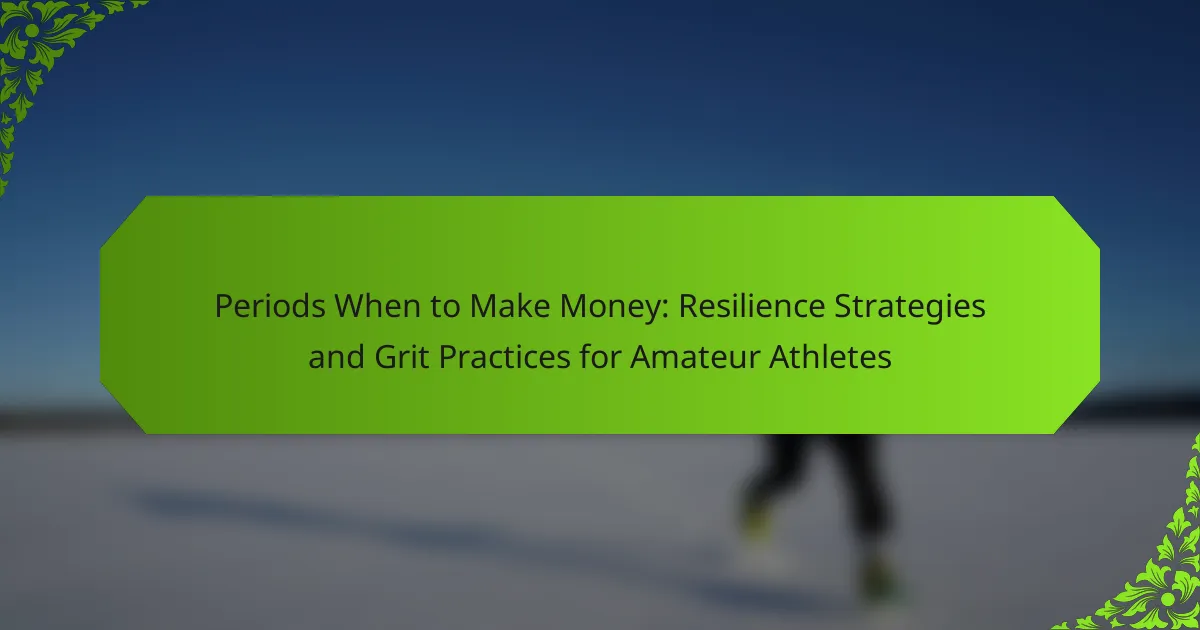Building resilience and grit is essential for amateur athletes to enhance mental toughness and achieve success. This article explores the importance of these traits, practices to develop them, and the role of community support. It also highlights common mistakes athletes make in mental preparation and offers actionable tips for immediate improvement. By prioritising these strategies, athletes can effectively navigate challenges and improve their performance.
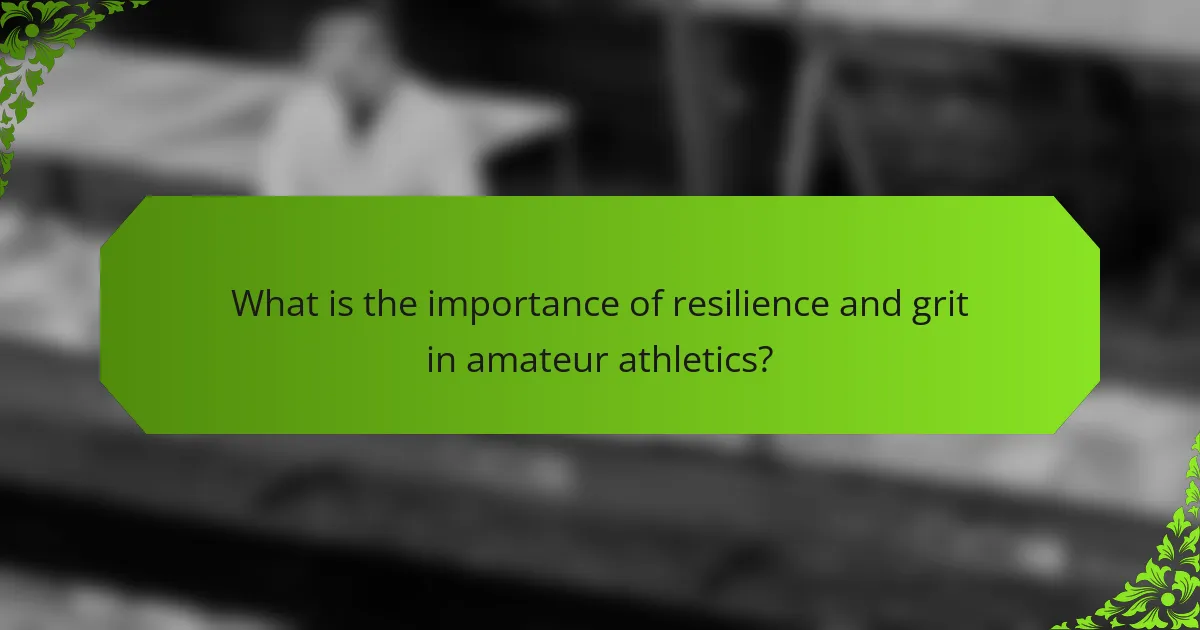
What is the importance of resilience and grit in amateur athletics?
Resilience and grit are crucial for amateur athletes as they enhance mental toughness. These traits enable athletes to overcome challenges, maintain focus, and persevere through setbacks. Developing resilience leads to improved performance, while grit fosters a strong work ethic and commitment to long-term goals. Research indicates that athletes with higher resilience levels are more likely to achieve success, as they adapt better to stress and adversity. Emphasising these qualities can significantly impact an athlete’s journey, encouraging a mindset that prioritises growth and determination.
How do resilience and grit contribute to mental toughness?
Resilience and grit are essential for mental toughness in athletes. Resilience enables athletes to recover from setbacks, while grit drives persistence in the face of challenges. Together, they foster a mindset that embraces adversity, allowing athletes to push through difficulties. Research shows that athletes with high resilience and grit perform better under pressure, enhancing their overall mental toughness.
What are the psychological benefits of developing resilience and grit?
Developing resilience and grit enhances mental toughness, leading to improved focus, better stress management, and increased motivation. Resilient athletes can bounce back from setbacks and maintain a positive mindset, which is crucial for performance. Studies show that individuals with high resilience report lower levels of anxiety and depression, contributing to overall well-being. Grit fosters perseverance, enabling athletes to pursue long-term goals despite challenges, ultimately enhancing their competitive edge.

What universal practices can enhance resilience and grit?
Practices that enhance resilience and grit include setting clear goals, maintaining a positive mindset, and embracing challenges. These strategies help amateur athletes develop mental toughness.
Goal setting provides direction and motivation, while a positive mindset fosters perseverance. Embracing challenges encourages growth and adaptability, essential for overcoming obstacles.
Research indicates that athletes who regularly practice these techniques show improved performance and mental resilience. For instance, studies show that visualization techniques can enhance focus and reduce anxiety, contributing to overall mental toughness.
Incorporating these universal practices into training routines can significantly boost an athlete’s ability to handle pressure and setbacks, ultimately leading to greater success in their sport.
How can goal setting improve resilience in athletes?
Goal setting significantly enhances resilience in athletes by providing clear objectives and a structured path to achievement. This process fosters mental toughness, allowing athletes to focus on progress rather than setbacks. Specific, measurable goals create a sense of purpose, which can mitigate feelings of fear and anxiety during challenging situations. As a result, athletes develop grit, enabling them to overcome obstacles and maintain motivation. Research indicates that athletes with defined goals are more likely to persist through difficulties, ultimately leading to improved performance and mental fortitude.
What role does positive self-talk play in building grit?
Positive self-talk significantly enhances grit by reinforcing resilience in amateur athletes. It cultivates a growth mindset, allowing athletes to view challenges as opportunities. This mental shift encourages persistence and determination, essential components of grit. Research shows that positive self-talk can improve performance under pressure, leading to better outcomes in competitions. By consistently practicing positive affirmations, athletes build mental toughness, which is crucial for overcoming obstacles and achieving long-term goals.
How does visualization technique strengthen mental toughness?
Visualization techniques enhance mental toughness by enabling athletes to mentally rehearse success, reducing anxiety and improving focus. This method fosters resilience by creating a strong mental image of overcoming challenges. Research indicates that athletes employing visualization experience increased confidence and performance consistency. Moreover, visualization acts as a unique attribute in building grit, allowing amateur athletes to persist in the face of adversity.
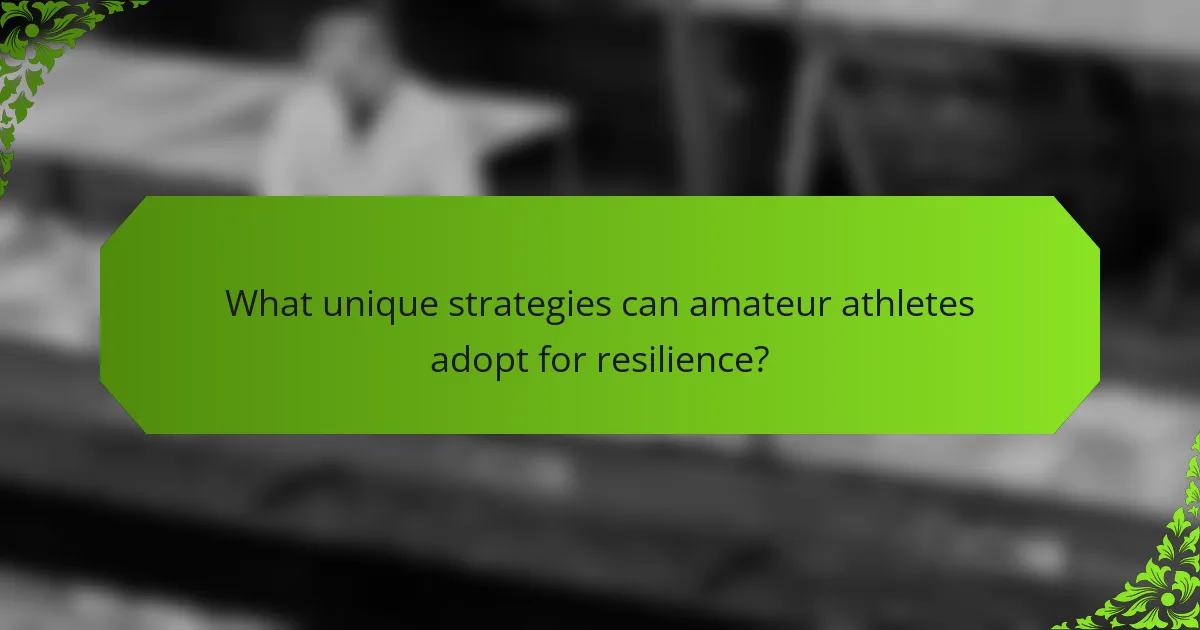
What unique strategies can amateur athletes adopt for resilience?
Amateur athletes can adopt unique strategies for resilience by focusing on mental conditioning, goal setting, and community support. Mental conditioning techniques, such as visualization and positive self-talk, enhance confidence and performance. Setting specific, measurable goals fosters a sense of achievement and motivation. Engaging with a supportive community provides encouragement and accountability, reinforcing a resilient mindset. By integrating these strategies, athletes can build grit and maintain mental toughness in challenging situations.
How can athletes use failure as a learning tool?
Athletes can use failure as a learning tool by analysing mistakes to improve performance. Embracing setbacks fosters resilience and grit, essential for mental toughness. For example, a study showed that athletes who reflect on failures develop better strategies for future competitions. This process transforms negative experiences into valuable lessons, enhancing overall growth and adaptability in their sport.
What are the benefits of mentorship in developing grit?
Mentorship significantly enhances grit by providing guidance, support, and accountability. It fosters resilience through shared experiences and constructive feedback. Mentors help athletes develop a growth mindset, encouraging them to embrace challenges and learn from failures. This relationship cultivates perseverance, essential for overcoming obstacles in sports. As a result, athletes with mentors often exhibit higher levels of mental toughness, leading to improved performance and personal growth.

What rare practices can set athletes apart in their journey?
Amateur athletes can set themselves apart by embracing rare practices that enhance mental toughness. These include visualization techniques, mindfulness meditation, and unconventional goal-setting strategies.
Visualization allows athletes to mentally rehearse performance scenarios, boosting confidence and focus. Mindfulness meditation fosters resilience by promoting emotional regulation and stress management. Unconventional goal-setting, such as setting process-based rather than outcome-based goals, encourages persistence and grit throughout training.
Incorporating these practices cultivates a unique mental framework, enabling athletes to overcome challenges effectively.
How can adopting a growth mindset lead to exceptional resilience?
Adopting a growth mindset fosters exceptional resilience by encouraging athletes to view challenges as opportunities for improvement. This mindset enhances mental toughness, enabling athletes to persist through setbacks and maintain focus. Research shows that individuals with a growth mindset are more likely to embrace difficulties, leading to greater perseverance and grit. As a result, amateur athletes can develop stronger coping strategies and adaptability, essential traits for long-term success in sports.
What uncommon rituals can enhance focus and determination?
Uncommon rituals that enhance focus and determination include visualization techniques, gratitude journaling, and breath control exercises. These practices foster mental resilience, enabling amateur athletes to overcome challenges and maintain grit. Visualization helps in mentally rehearsing success, while gratitude journaling promotes a positive mindset. Breath control exercises improve concentration by calming the mind, ultimately enhancing performance.
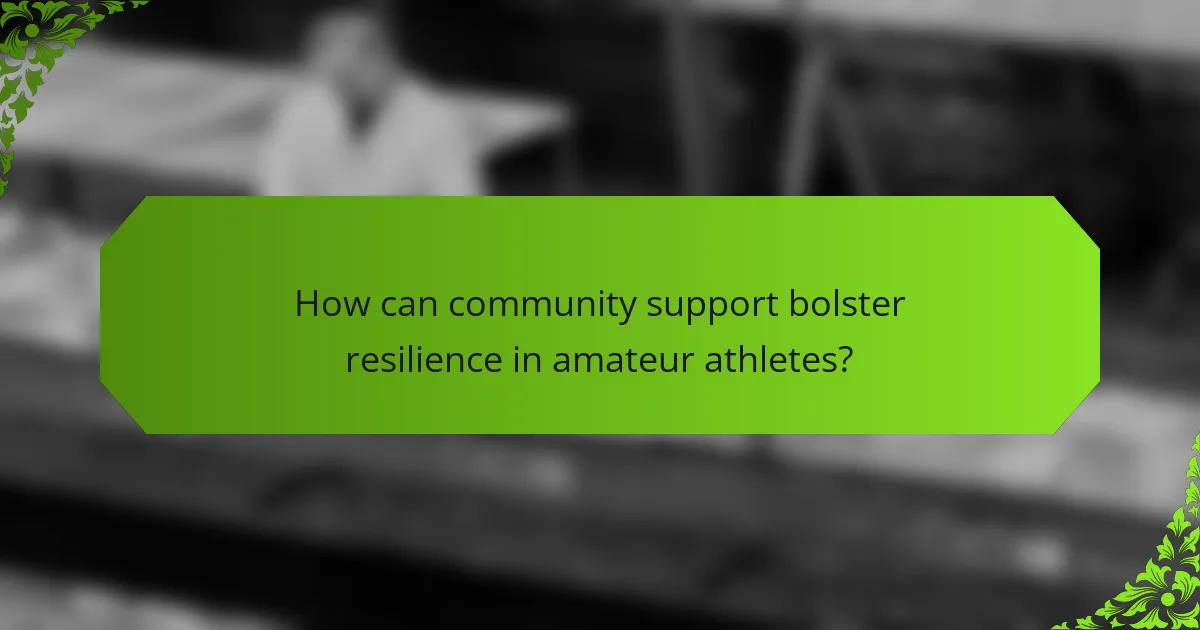
How can community support bolster resilience in amateur athletes?
Community support significantly enhances resilience in amateur athletes by providing emotional encouragement and practical resources. This backing fosters a sense of belonging, which is crucial for mental toughness. Studies show that athletes with strong community ties demonstrate higher perseverance and improved performance under pressure. Additionally, shared experiences within a supportive network can lead to unique coping strategies, reinforcing grit and determination. Ultimately, community engagement serves as a vital attribute in building mental resilience for amateur athletes.
What role do training partners play in building grit?
Training partners significantly enhance the development of grit in amateur athletes. They provide emotional support, accountability, and motivation during challenging training sessions. This collaborative environment fosters resilience, pushing athletes to confront their fears and persist through adversity. Research shows that social support is a unique attribute that can lead to improved mental toughness. Engaging with training partners creates a sense of community, which reinforces the belief in overcoming obstacles. As a result, athletes are more likely to embrace challenges, thereby cultivating a strong mindset essential for success.
How can local sports clubs foster a culture of resilience?
Local sports clubs can foster resilience by promoting a supportive environment, emphasising mental toughness, and encouraging perseverance. They should implement programs that focus on skill development and coping strategies. Regular workshops on mental health can enhance athletes’ grit. Team-building activities strengthen bonds, creating a community that values resilience. Recognition of personal achievements, regardless of competition outcomes, reinforces a growth mindset.
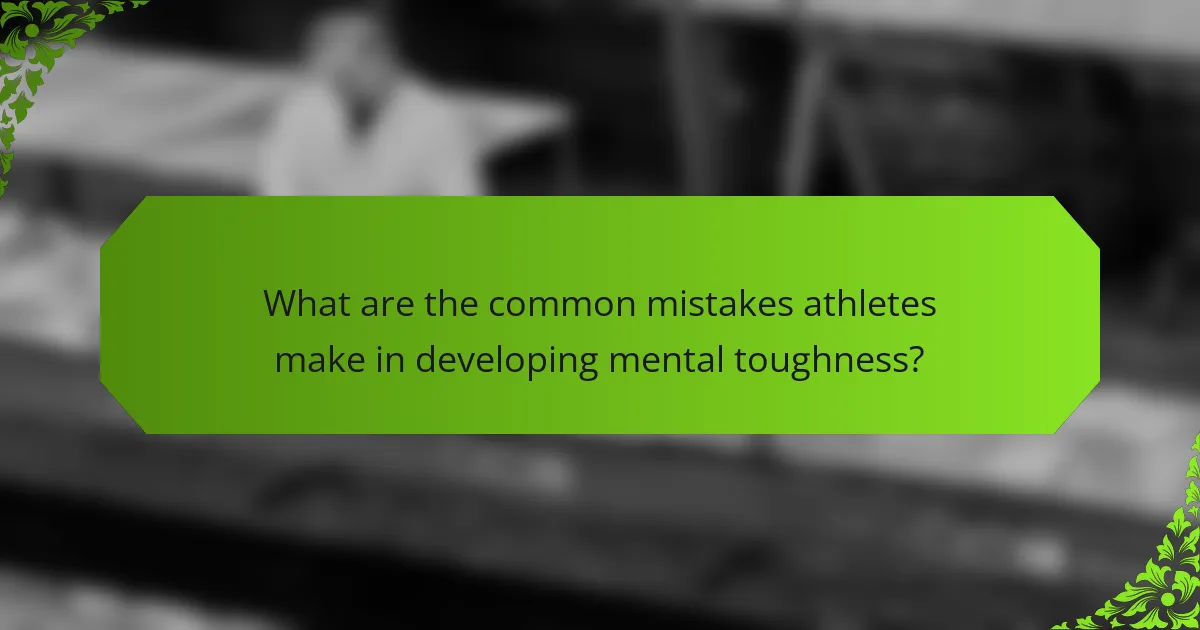
What are the common mistakes athletes make in developing mental toughness?
Athletes often make several common mistakes in developing mental toughness. These include underestimating the importance of mental preparation, neglecting self-talk, failing to embrace discomfort, and not setting specific goals.
Underestimating mental preparation can lead to a lack of resilience during competition. Neglecting self-talk may result in negative thoughts affecting performance. Failing to embrace discomfort prevents athletes from building grit. Lastly, not setting specific goals can hinder focus and motivation.
How can athletes avoid burnout while building resilience?
Athletes can avoid burnout and build resilience by prioritising mental health, setting realistic goals, and practising self-care. Establishing a routine that includes rest and recovery is essential. Mindfulness techniques, such as meditation, enhance focus and reduce stress, while positive self-talk fosters a growth mindset. Engaging in supportive social networks provides emotional reinforcement, promoting grit and perseverance. Balancing training with personal interests prevents overcommitment, sustaining motivation and enjoyment in the sport.
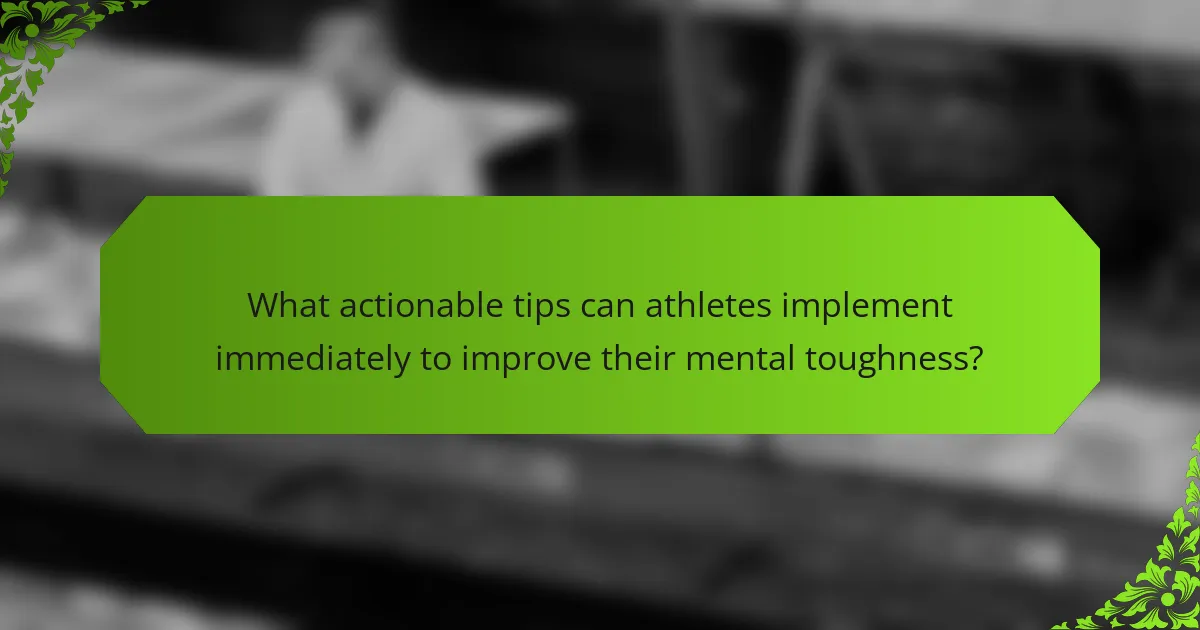
What actionable tips can athletes implement immediately to improve their mental toughness?
Athletes can implement several actionable tips to enhance mental toughness immediately. Focus on setting clear goals to build motivation and direction. Practice visualization techniques to mentally rehearse success, which fosters confidence. Develop a routine that includes mindfulness or meditation to improve focus and reduce anxiety. Engage in positive self-talk to counter negative thoughts, reinforcing resilience. Finally, embrace challenges as opportunities for growth, fostering a grit mindset.
What daily habits can enhance resilience and grit?
Daily habits that enhance resilience and grit include setting clear goals, maintaining a positive mindset, and practising self-reflection. Regular physical activity builds mental toughness, while mindfulness techniques improve focus and stress management. Engaging in supportive social networks fosters motivation and accountability. Consistent practice of these habits develops a strong foundation for mental endurance.
How can athletes track their progress in building mental toughness?
Athletes can track their progress in building mental toughness through regular self-assessment and reflection. They should set specific, measurable goals related to resilience and grit, then evaluate their performance against these benchmarks.
Utilising journals can help document experiences, thoughts, and feelings during training and competition. This practice allows athletes to identify patterns, triggers, and areas for improvement.
Incorporating feedback from coaches and peers enhances self-awareness and accountability. Regular discussions about mental challenges faced during training can provide valuable insights into personal growth.
Finally, athletes can use visualization techniques to mentally rehearse scenarios, which builds confidence and reinforces their commitment to mental toughness.
